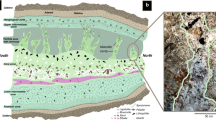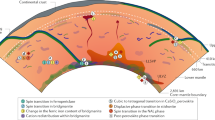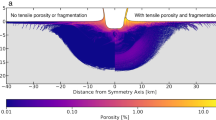Abstract
A GEOPHYSICAL discussion on the origin of the Earth reported in Nature some time ago1 included an account of his so-called ‘pore theory’ by Mr. T. Gold. He suggested that an Earth which formed by the agglomeration of solid dust particles would, due to the heating effects of compression and radioactivity, contain a certain fraction of liquid mixed with the solid. A structure of pores or veins of liquid might be set up, and the percolation downwards and upwards of dense and light liquids could account for the formation of the Earth's core and of its atmosphere and oceans, respectively, while various hydraulic actions could explain earthquakes, vulcanism and structural features such as great upheavals.
This is a preview of subscription content, access via your institution
Access options
Subscribe to this journal
Receive 51 print issues and online access
$199.00 per year
only $3.90 per issue
Buy this article
- Purchase on Springer Link
- Instant access to full article PDF
Prices may be subject to local taxes which are calculated during checkout
Similar content being viewed by others
References
Nature, 175, 575 (1955).
Trans. Roy. Soc. Edin., 23, 169 (1864); “Mathematical and Physical Papers”, 3, 311.
Author information
Authors and Affiliations
Rights and permissions
About this article
Cite this article
ALLAN, D. Kelvin on the Origin of the Earth. Nature 177, 801–802 (1956). https://doi.org/10.1038/177801a0
Issue Date:
DOI: https://doi.org/10.1038/177801a0
Comments
By submitting a comment you agree to abide by our Terms and Community Guidelines. If you find something abusive or that does not comply with our terms or guidelines please flag it as inappropriate.



